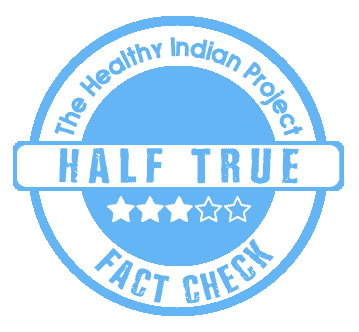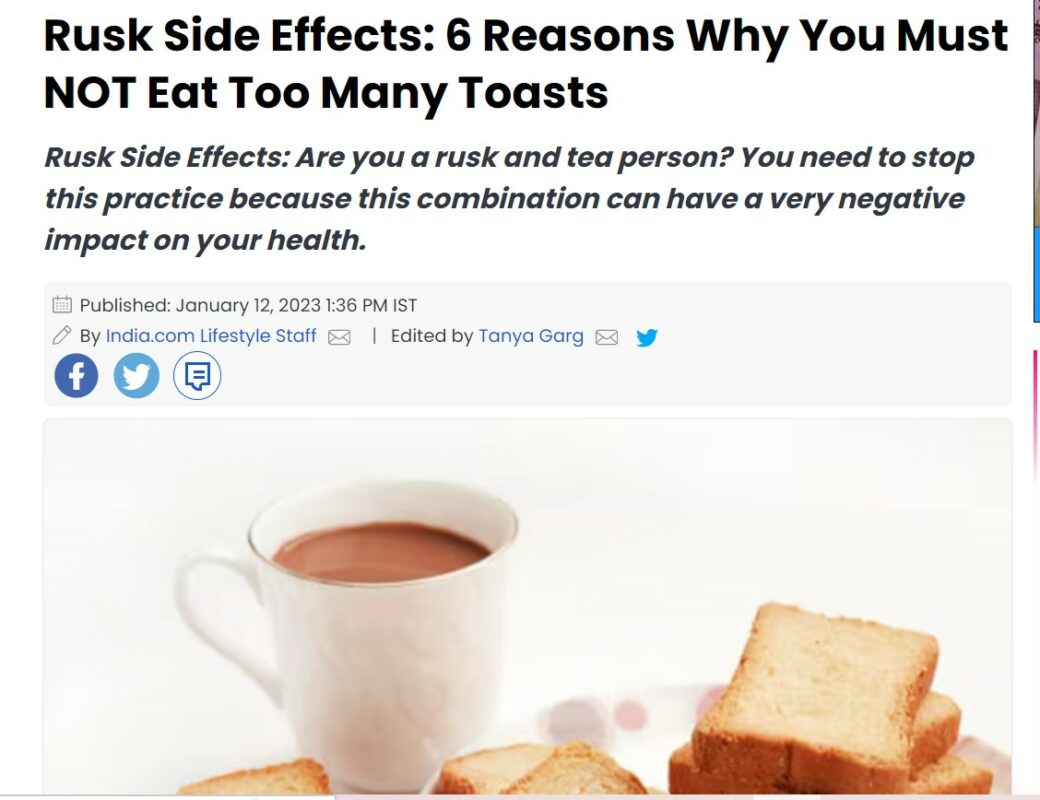Last Updated on February 9, 2023 by Neelam Singh
Quick Take

It has been suggested on social media that eating rusks can cause celiac disease. We verified the assertion. We discovered that the claim is only Half True.
The claim
According to a social media post with the title “Rusk Side Effects: 6 Reasons Why You Must Not Eat Too Many Toasts,” any type of rusk, which is a popular breakfast food, may cause a number of health issues, with celiac disease being the main concern.

Fact Check
What is the primary cause of celiac disease?
A condition known as celiac disease is brought on by eating gluten and results in an immune reaction in the small intestine. Over time, this reaction thins out the lining of your small intestine and impairs the absorption of some nutrients.
The precise cause of celiac disease is unknown, but it may be influenced by your genes, consuming gluten-containing foods, and other factors. Additionally, infant feeding practices, gastrointestinal infections, and gut bacteria may be involved.
Intestinal damage frequently results in diarrhoea, exhaustion, weight loss, bloating, and anaemia and can have serious consequences. The small, hair-like projections that line the small intestine are harmed when the body’s immune system overreacts to gluten in food.
Are all varieties of rusks capable of causing celiac disease?
No, not all rusk varieties. One of the earliest baked goods is whole-wheat rusk, which is made from wheat flour. It is frequently eaten as a snack with tea or milk and has a long shelf life. A hard, dry, twice-baked biscuit or bread is referred to as rusk. It can occasionally be used as a teether for infants. The name also refers to a food additive produced in the UK using wheat. Rusk is also known as toast because it is crispier and dryer when it is toasted at a higher temperature. It is a well-liked bakery item among older people and working-class members who supplement their diets. It is typically consumed with milky tea at teatime, which softens the rusk.
In the course of our research, we discovered that tea contains tannins, a subclass of compounds known as polyphenols. These tannins may be hydrolysable and condensed. Various edible and inedible plants, such as tree bark, leaves, spices, nuts, seeds, fruits, and legumes, naturally contain these compounds. They are typically produced by plants as a natural defense against pests, and they also give plant foods their colour and flavour. Tea, coffee, wine, and chocolate are some of the richest and most popular dietary sources of condensed tannins. Additional findings from our research showed that wheat gluten and condensed gluten can crosslink. However, it is unclear what processes lead to these interactions. Nevertheless, only wheat rusks were found to contain gluten in our study; other rusk varieties were found to be gluten-free.
Please note that the other varieties of rusks primarily consist of semolina, gluten-free rusks, and those supplemented with flax seeds, chia seeds, and millets. These modifications have greatly decreased their gluten content while also improving their nutritional value.
Despite this, we were unable to find any convincing evidence in our research to suggest that eating gluten-containing foods, such as wheat rusks, significantly increases the risk of developing celiac disease. This is a result of the debate over wheat’s role and other possible causes of the rising incidence of celiac disease. According to some theories, factors that contribute to the toxicity of wheat in genetically vulnerable people include daily gluten consumption, variation in the types of wheat gluten consumed, and agricultural practices that affect wheat protein content.
What advantages does a gluten-free diet have?
A gluten-free diet is essential for the management of celiac disease symptoms as well as those of other illnesses associated with gluten. A gluten-free diet is beneficial for everyone who follows it, even those without a health condition linked to gluten. Although more research is needed, the diet’s alleged benefits include improved health, weight loss, and increased energy levels.
It’s critical to carefully consider the foods you choose, their ingredients, and their nutritional value when adhering to a gluten-free diet. The diet includes the vast majority of low-fat dairy products, as well as the vast majority of natural, unprocessed eggs, meats, fish, and vegetables. This diet forbids the consumption of wheat, rye, barley, and triticale.
THIP MEDIA TAKE: We come to the conclusion that even though gluten is a very important celiac disease trigger, it is not present in all of the rusk varieties. Additionally, there is no strong evidence to support the claim that eating any kind of rusk increases your risk of developing celiac disease. However, caution is required due to the excessive consumption of wheat rusks, especially with tea. Therefore, the claim is only half true.
Disclaimer: Medical Science is an ever evolving field. We strive to keep this page updated. In case you notice any discrepancy in the content, please inform us at [email protected]. You can futher read our Correction Policy here. Never disregard professional medical advice or delay seeking medical treatment because of something you have read on or accessed through this website or it's social media channels. Read our Full Disclaimer Here for further information.

